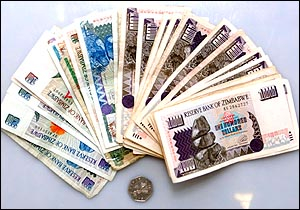
Very Small Change
Ok, kids! Write a short essay about this analysis:
Last month a new 200,000 Zimbabwe dollar note was launched, in a bid to tackle the country’s inflation, the highest in the world.
The country’s government has created a commission to find a way to control soaring living costs.
But correspondents say that as long as Zimbabwe has a shortage of staple foods, including maize, food shortages are likely to continue.
Avoid words and phrases such as “idiotic,” “stupid,” “printing more money won’t stop money from losing its value,” and — regarding the last sentence — “duh.”










It seems to me that they aren’t much ‘dumber’ than the federal reserve. Perhaps Zimbabwe needs a better bankruptcy system. In America, there is never enough money to pay debts because the money comes from government borrowing, not including interest due. Thus, someone must always be losing, yes? Is it even theoretically possible to pay off all debts under the federal reserve fiat money system? If not, the entire system and every credit contract is based upon fraud in the inducement.
Not so, David. The U.S. inflation rate is subtantially lower than the rate in Zimbabwe. I live here, and can assure you it is less than 13,000 percent.
Furthermore, the Federal Reserve controls the money supply but not the national debt, which is controlled by Congress and the President. So money does *not* come from government borrowing.
I have no idea why you say “someone must always be losing,” unless you assume that borrowing at interest necessarily means someone loses. If you believe this, you should realize that this is an economic fallacy, because loanable funds markets can result in mutually beneficial trades. The argument against usury was refuted even before Adam Smith was born.
All debts could certainly be paid off under the current system.
There’s little doubt that the government is currently spending too much, on things it shouldn’t be spending, and that fiscal responsibility is urgently needed, but you’ve mischaracterized the situation.
Well, it’s too complicated to unwind here, but how does money enter the money supply? As I understand it, the fed essentially writes a check to a government securities dealer for an interest-bearing debt to the government. The check is deposited in a member bank, and after that bank lends out all but its reserve requirement, wallah! the money supply ‘expanded’, and the federal government owes money to the dealer, and the borrowers owe money to the member banks. And where, exactly, will they get the money to pay principal and interest? Each dollar has already been obligated and reobligated in the banking system. Interest creates new obligations, yet if someone withdraws $5 from savings to purchase a product built in a business from loaned money, that bank must close out around $50 in liabilities to maintain reserves (10% reserve req.). It seems to me that the only thing that keeps it afloat is new government borrowing — and bankruptcies — economic losers sucked through the pressure release valves.
David, you write: “As I understand it, the fed essentially writes a check to a government securities dealer for an interest-bearing debt to the government. The check is deposited in a member bank, and after that bank lends out all but its reserve requirement, wallah! the money supply ‘expanded’,”
So far, you are correct.
But then “the federal government owes money to the dealer” isn’t right. The dealer no longer has the debt instrument. The federal treasury now owes the federal reserve.
“the borrowers owe money to the member banks. And where, exactly, will they get the money to pay principal and interest? Each dollar has already been obligated and reobligated in the banking system”
This is also mistaken. The borrowers have money that was loaned to them by the member banks. Presumably they will be able to pay it back, with interest, either because 1) they are using it to make investments that will generate a return greater than the interest rate, or 2) they are financing consumer spending and have been able to show sufficient future earning potential to warrant the loan.
Either way the issue of every dollar being obligated and re-obligated is a red herring. After all, in 2006, U.S. GDP was 13.2 trillion in current dollar terms, and the money supply was only about 1.4 trillion (M1) or 7 trillion (M2), so each dollar was “obligated and reobligated,” was it not? But so too when A owes B and B owes C, the dollars are “reobligated.” But why would this be a problem?
Also, new government borrowing doesn’t necessarily become increased money supply. In fact, the fed could sell its federal debt holdings and even shrink the supply, at the same time the government were borrowing more. And if the government were to completely cease borrowing (by ending deficit spending) the fed could still expand the money supply by purchasing existing government debt.
Some interesting points and clarifications, well taken, as I’m certainly no expert on the economics of central banking. However, it remains counterintuitive to me that a rational person will give up something he owns (his natural property and labor) for the right to repurchase it with interest.
Setting aside the question of the government obligating the labor of all its citizens, including the unborn (something I call slavery or original sin, take your pick)…if the fed purchases gov’t debt (an asset to the bank), what is the “liability”? Other than perhaps the extinction of government debt… Something that came to an abrupt end on September 11, 2001.
Camiones de gran tonelaje
Camion transport wil
Descargar de
Descargar daemon tool
Kaffee aus eu
Kaffee aufsteller
Lage von gerade und ebene
Lage von gerade und ebene
Free clerical training
Free clerical testing